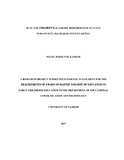| dc.description.abstract | The purpose of this study was to investigate the effect of play on preschool children‘s
academic performance in Yatta Sub-County, Machakos County, Kenya. The study was guided
by three objectives which focused on types of materials, types of play and time allocated to
play and their effect on children‘s performance. The literature review presented findings of
related studies on the effect of types of play, play materials and time allocation for play on
children‘s academic performance. The study was hinged on Froebel‘s (1852) theory, which
states that play is a serious and deeply significant activity for young child. Froebel viewed
kindergartens as institutions where children instruct and educate themselves and where they
develop and integrate all their abilities through play. The study employed quasi-experimental
research design and the targeted all the 60 public pre-schools and private pre-schools in Yatta
Sub County with a population of 1800 pre-school children and 62 pre-school teachers. The
tools for data collection were questionnaires and performance test. The study established that
use of different play materials had a positive effect on academic performance of preschool
children. It was found that using the number board yielded higher scores especially in
arithmetic followed by skipping robes. There was also greater improvement in the mean score
between the pre-test and post test when children were exposed to types of play. When
children were exposed to teacher initiated and guided play, they tended to record the highest
improvement in their mean score. Role play and group play also significantly enhanced
children‘s academic performance. Lastly, there was a significant change in the mean score of
children with increase in time allocated for play and therefore play time has a significant
effect on academic performance. Based on the findings, the study recommended that teachers
need to create more time for the children to be engaged in play. There is also need to use a
variety of play materials in schools in addition to provision of adequate space for play.
Teachers also need to be innovative and come up with more playing materials from the school
environment. In order to supplement the results of this study there is need to carry out a
similar study in the rest of the country | en_US |

